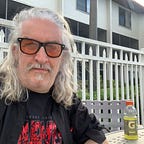Spotlight series #65 : Melanie Dennis Unrau
Curated by Canadian writer, editor and publisher rob mclennan, the “spotlight” series appears the first Monday of every month.
STATEMENT
S.C. Ells (1878–1971), also known as “the father of the tar sands,” was a civil servant who worked for the Department of Mines from 1913 to 1945, devoting most of those years to his dream of industrializing the Athabasca oil/tar sands.
“Envoi” is a poem written in response to the envoi Ells penned to conclude both his illustrated collection of short stories and poems titled Northland Trails and his memoir titled Recollections of the Development of the Athabasca Oil Sands. You can read Ells’s poem, “Epilogue,” as it appeared in the 1938 edition of Northland Trails, here. In it, Ells expresses what I take as a disingenuous wish to be buried in “on a wind swept ridge” near Fort McMurray, Alberta. Ells uses appropriated imagery and language to indigenize himself and make claims to belong on Chipewyan, Cree, and Métis territory (Treaty 8).
“Envoi” is also written in response to visiting Ells’s grave. While on a research trip to Ottawa (unceded Algonquin territory) to visit Ells’s fonds at the National Archive in 2018, I became curious about the final resting place of this man who claimed to love the “northland” so dearly yet who was also determined to be remembered as a “great man.” There is perhaps no better place for a so-called great Canadian to be buried than Beechwood Cemetery in Ottawa, but the cemetery and the land itself have been less than deferential to Ells.
Ells has never been remembered or credited as often as he would have liked for his contributions to the colonial-modernist project of industrializing the tar sands. I found a neglected and damaged gravesite in the cemetery, a sign that he receives few visits from grateful children of the petrostate. Yet, Ells was indeed a “great man” of the type whose monuments, effigies, and namesakes are now being toppled, removed, and revoked. My recent poetry engages with Ells as a problematic historical figure, father figure, colonizer, artist, and poet.
THREE POEMS
Envoi
Sid Ells
father of us all
who milked oil from bituminous sands
and wished to be buried under
a certain northland tree
lies in the Beechwood Cemetery
that crowded city of dead
war heroes
prime ministers
and poets
On your first visit
to croon a lullaby to old daddy-o
you can’t find him
your restless feet hurry above his head
Next morning during business hours
directed to the same spot
you had paced before
you find Sid wordless for once
holding ground beside parents and siblings
in this stale Canadian Who’s Who
Sid does rest under a tree
does stretch his buckskinned feet [sic]
where furry things sometimes play
where perhaps it was those old friends
those tricksters
who turned his stone
nose down
rolled his grave over him
You can’t read its bottom side
half covered with grass
nor Sid’s name
spelled backward in the land
upon which
he always longed
to make an impression
The Goose: My northland symphony!
1.
the
long
silence
2.
Whirr of wings
soft
whir
muted music
wild free harmony
calls
call call call calling
‘Awake, Awake!’
Clamour clangor clear
strident clangor strident clamour of triumphant cry
triumphant cry
triumphant clarion triumphant clarion cries
3.
Gabbling gabbling gabbing
strident voice honking honking
honking clangor
clangor of clangor of many many voices
clamor of many voices
voices
4.
a last farewell
calling faintly down
a last farewell
call down a faint farewell
The Goose: Fancy
From highways of the sky, I hear
muted music, gray-winged,
a northland symphony
sent down
Triumphant clarion calls of
Stout-hearted sky-wanderers,
heralds of the verdant Spring
flying north to freedom
their northern home
With winnowing wings and strident voice
marshalling their wavering wedges
companies and battalions for the long flight
riders of the autumn gales call farewell
I fancy a-winging across the northern wilderness
Melanie Dennis Unrau respectfully acknowledges the original caretakers of the land known as Treaty 1/Winnipeg, where she lives as a guest of mixed European ancestry on the traditional territory of the Anishinaabeg, Cree, Oji-Cree, Dakota, and Dene peoples and the homeland of the Métis Nation. Melanie is a SSHRC Postdoctoral Fellow in English and Comparative Literature at Columbia University and a Research Affiliate at the University of Manitoba Institute for the Humanities. She is the author of Happiness Threads: The Unborn Poems (Muses’ Company, 2013), a former editor and poetry editor at Geez magazine, and a former co-editor of The Goose: A Journal of Arts, Environment, and Culture in Canada. Her poetry has appeared in Lemon Hound, Dusie, Geez, Rhubarb, Intotemak, the book Exposed (Muses’ Company, 2002), in exhibitions at Mentoring Artists for Women’s Art in Winnipeg, and elsewhere. Melanie recently edited an issue of G U E S T: a journal of guest editors on the theme of petropoetics.
